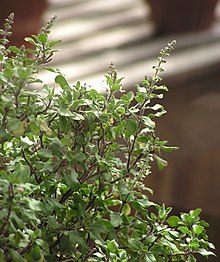Ocimum tenuiflorum, also known as Ocimum sanctum, holy basil, or tulasi (other spelling thulasi), is an aromatic plant in the family Lamiaceae which is native to the Indian subcontinent and widespread as a cultivated plant throughout the Southeast Asian tropics. It is an erect, many branched subshrub, 30–60 cm (12–24 in) tall with hairy stems and simple phyllotaxic green or purple leaves that are strongly scented.

Leaves have petioles and are ovate, up to 5 cm (2.0 in) long, usually slightly toothed. The flowers are purplish in elongate racemes in close whorls.The two main morphotypes cultivated in India and Nepal are green-leaved (Sri or Lakshmi tulasi) and purple-leaved (Krishna tulasi).
Tulasi is cultivated for religious and medicinal purposes, and for its essential oil. It is widely known across the Indian subcontinent as a medicinal plant and an herbal tea, commonly used in Ayurveda, and has an important role within the Vaishnava tradition of Hinduism, in which devotees perform worship involving holy basil plants or leaves. This plant is revered as an elixir of life.
The variety of Ocimum tenuiflorum used in Thai cuisine is referred to as Thai holy basil (Thai: กะเพรา kaphrao); it is not to be confused with Thai basil, which is a variety of Ocimum basilicum.
DNA barcodes of various biogeographical isolates of Tulsi from the Indian subcontinent are now available. In a large-scale phylogeographical study of this species conducted using chloroplast genome sequences, a group of researchers from Central University of Punjab, Bathinda have found that this plant originates from North Central India. The finding is especially interesting, as this region has played important roles in the religious and cultural uprising of India, and the present discovery might suggest the evolution of Tulasi is related with the cultural migratory patterns in the Indian subcontinent.
Tulasi (Sanskrit:-Surasa) has been used for thousands of years in Ayurveda for its diverse healing properties. It is mentioned in the Charaka Samhita, an ancient Ayurvedic text. Tulsi is considered to be an adaptogen, balancing different processes in the body, and helpful for adapting to stress. Marked by its strong aroma and astringent taste, it is regarded in Ayurveda as a kind of "elixir of life" and believed to promote longevity.
Tulasi extracts are used in ayurvedic remedies for a variety of ailments. Traditionally, tulasi is taken in many forms: as herbal tea, dried powder, fresh leaf or mixed with ghee. Essential oil extracted from Karpoora tulasi is mostly used for medicinal purposes and in herbal cosmetics.
No comments:
Post a Comment